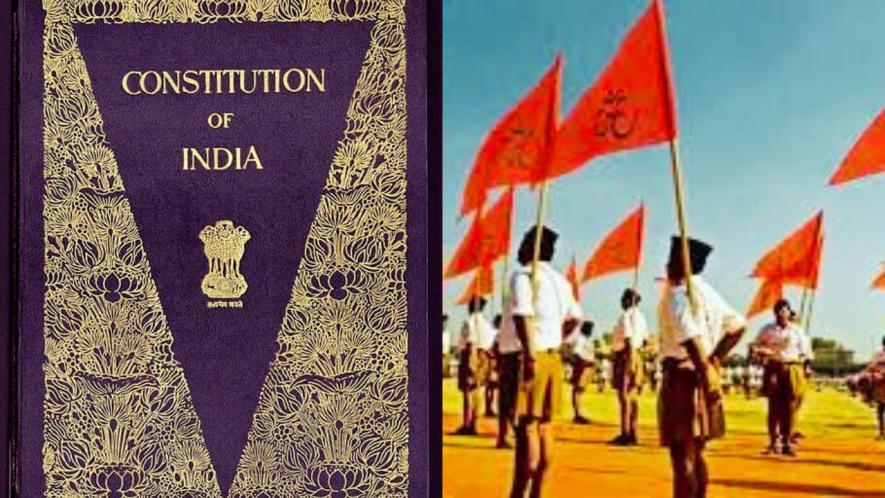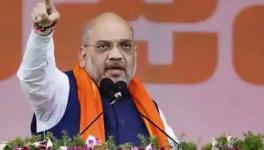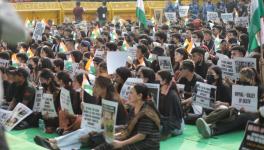Baba Saheb Ambedkar, Hindu Right Wing and Indian National Congress

In the recent debate in Parliament, (December 2025) Home Minister Amit Shah made a speech, which on one hand was insulting to Babasaheb, on the other hand, it tried to show that Indian National Congress treated him badly, while now with BJP in the ruling saddle, he is getting his due. Protests are going on asking Shah to resign and apologise for his comment that “it has become a fashion to recite Ambedkar’s name.” These reactions to Shah will definitely pull down his intimidating political weight.
Shah then went on to self-congratulate how his party had been doing justice to Babsaheb. In this, the first step he pointed out is building statues. Now, is this a step Ambedkar would have appreciated beyond a point?
Shah took credit for beginning to celebrate Babasaheb’s birthday as ‘Samajik Samrasta Divas’ (Social Harmony Day or SSD). As such, it is totally contrary to what Babasaheb had dreamt of. He had talked of annihilation of caste. The Rashtriya Swayamsevak Sangh or RSS-BJP by beginning SSD is actually putting forward an agenda that negates Ambedkar’s dream and vision of a casteless society. SSD stands for perpetuation of the caste system with harmony between different castes.
At deeper philosophical level, BJP also upholds Deen Dayal Upadhyay’s ‘Integral Humanism’, which states that Hindu society is created from the primeval man, Brahmins from mouth, Kshtriyas from arms, Vaishyas from thighs and Shudras from feet. This division gives stability to the society according to their ideology!
If RSS-BJP had to really do justice to Ambedkar, they would not have introduced reservations for Economic Weaker Sections of society, as it dilutes the reservation for Dalits/Other Backward Classes/Scheduled Tribes. They would have ensured the anti-Dalit atrocities get reduced; the violence against women is reduced.
As far as Shah’s claim that Congress ignored Ambedkar and did not do justice to him, needs to be examined a bit deeply. To be very sure, Ambedkar’s push for social justice was not assisted or helped by Hindu nationalist forces.
The national leadership took the issue of untouchability and caste seriously particularly from the decades of 1930s.
Gandhi, from 1932, took the eradication of untouchability and the caste system so seriously that for a couple of years, he focused on this issue seriously. He decided not to bless any marriage that was not an inter-caste one. He gave shelter to a Dalit family in Sabarmati Ashram against protests to the point of its closure, as the funders stopped funding because of this.
Though his election to Lok Sabha was opposed by Congress, Hindu Mahasabha was also part of those opposing Babasaheb in the electoral battle and later he was nominated into Rajya Sabha. It was Gandhi again who ensured that Ambedkar was part of the interim government. Also, it was on Gandhi’s advice that Ambedkar was made Chairman of the Drafting Committee of Indian Constitution.
Shah also propagated that Ambedkar was opposed to the government's foreign policy and Article 370 because of which he resigned from the cabinet. He was in the cabinet, which worked on democratic principles. In the matter of Kashmir, he wanted to have a zonal plebiscite- Kashmir Valley, Jammu and Ladakh separately, which was with a view to doing justice to the local ethnic variations. Shah is totally wrong in saying that it was due to these reasons that Ambedkar resigned from cabinet.
The real cause of Ambedkar’s resignation was the failure of Hindu Code Bill (HCB) to get passed in its original form in Parliament. It was Jawaharlal Nehru who had requested Ambedkar to draft the HCB. While drafting it, Ambedkar kept women’s equality at the forefront. The background of this Bill was that different religious communities had different codes guiding their personal laws. Personal laws are applicable in case of marriage, divorce, inheritance and custody of children.
As the HCB was made public, there was a hue and cry against it. RSS and its cohorts propagated that it is an attempt to finish Sanatan Dharma. Huge protests were organised and Ambedkar and Nehru's effigies were burnt by RSS followers on December 12, 1949.
A large number of public meetings were organised and a social atmosphere was created against Ambedkar and the HCB. There were many within Congress also who were opposed to this. The Bill could not get passed and that pained Ambedkar so much that he decided to resign.
Attributing his resignation to Congress, insulting him and ignoring him puts the truth on its head.
As such, Ambedkar and RSS combine’s ideology are two opposite poles of Indian politics. From the past over three decades, the RSS-BJP is trying to win over Dalits, adivsasis for electoral reasons, and for this they have undertaken cosmetic steps to woo them. Large sections of Dalits are attached to Constitution, as they see its role in liberating them from caste slavery. In the 2024 general elections, this became one of the factors in Dalits shifting toward Congress.
Another major contribution by Ambedkar, the making of Indian Constitution, was also opposed by BJP’s parent organisation, RSS. It's mouthpiece Organiser dated November, 30, 1949 stated, “The worst [thing] about the new Constitution of Bharat is that there is nothing Bharatiya about it… [T]here is no trace of ancient Bharatiya constitutional laws, institutions, nomenclature and phraseology in it”. Similarly, Hindutva politics’ ideological parent, Savarkar, also stated that there was “nothing Indian” in the Indian Constitution.
Holding strong positions in opposing Ambedkar’s two major contributions now, Shah is trying to claim that it is BJP that has given due credit to him. All their actions are symbolic and not substantive. Ambedkar, in the revised edition of his book, Thoughts on Pakistan, does state that the formation of Pakistan would be “a tragedy for us” and that it may pave the way for Hindu Raj, which will be a gross tragedy, opening the path for slavery of Dalits in particular.
Hindu Rashtra is the central agenda of the ilk of Shah, a concept totally opposed to the goals of Liberty, Equality, Fraternity and Social justice -- the core values of Babasaheb.
The writer is a human rights activist, who taught at IIT Bombay. The views are personal.
Get the latest reports & analysis with people's perspective on Protests, movements & deep analytical videos, discussions of the current affairs in your Telegram app. Subscribe to NewsClick's Telegram channel & get Real-Time updates on stories, as they get published on our website.
























